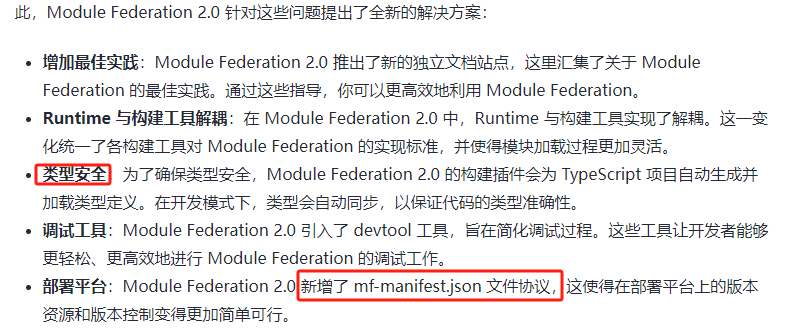# [设计]webpack-module-federation(模块联邦+官方插件)
- @doc https://module-federation.io/zh/index.html (opens new window)
- @code https://github.com/module-federation/core (opens new window)
# 参考 @ref
详解 Module Federation 的实现原理@nice
const { ModuleFederationPlugin } = require('webpack').container;
const HtmlWebpackPlugin = require('html-webpack-plugin');
const path = require('path');
module.exports = {
entry: './index.js',
// ....
plugins: [
new ModuleFederationPlugin({
name: 'component_app',
filename: 'remoteEntry.js',
exposes: {
'./Button': './src/Button.jsx',
'./Dialog': './src/Dialog.jsx',
'./Logo': './src/Logo.jsx',
'./ToolTip': './src/ToolTip.jsx',
},
shared: { react: { singleton: true }, 'react-dom': { singleton: true } },
})
]
};
===
const Button = React.lazy(() => import('component-app/Button'));
<Suspense fallback={<div>Loading...</div>}>
<Button />
</Suspense>
// 使用 MF 构建出的产物新增了
remoteEntry-chunk
shared-chunk
expose-chunk
async-chunk
// 必须把原来的入口代码放到 bootstrap.js 里面
// 通过 JSONP 的形式去加载远程应用
拿到远程应用的 remoteEntry.js 文件后再去执行
webpack_require.I -- 初始化共享依赖
webpack_require.S -- 获取适合的版本
===
性能问题
多版本问题


- 字节 Web Infra 团队和 Module Federation 作者联手,正式推出 Module Federation 2.0!
原本嵌入在 Webpack 中的 Module Federation Runtime 能力被提取出来
形成了一个独立的 SDK
import { init, loadRemote } from '@module-federation/enhanced/runtime';
init({
name: '@demo/app-main',
remotes: [
{
name: "@demo/app1",
entry: "http://localhost:3005/mf-manifest.json",
alias: "app1"
},
{
name: "@demo/app2",
entry: "http://localhost:3006/remoteEntry.js",
alias: "app2"
},
],
});
loadRemote("app2/util").then((md)=>{
md.add(1,2,3);
});
